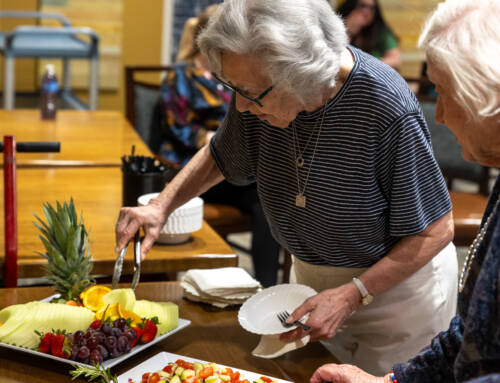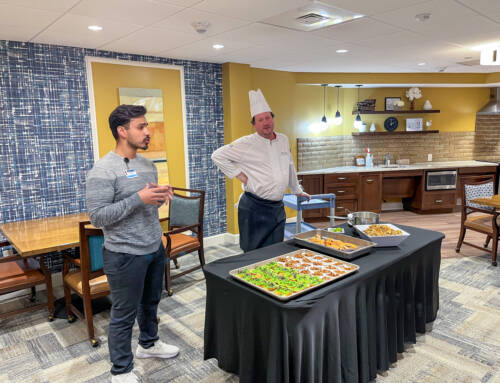William Anderson spent his early life serving his country as a Marine and 27 years as a field agent with the FBI. He and his wife, Camilla, moved to Masonic Village at Elizabethtown in 2005. They enjoyed their new neighbors and the campus, and William looked forward to more time spent growing wild flowers, making furniture and reading.
About five years ago, Camilla noticed changes in William. He was eventually diagnosed with Alzheimer’s disease, and her focus has been on caring for him ever since. To help her navigate the role of being a full-time caregiver, she attends monthly meetings of Masonic Village’s Caregiver Support Group.
“It’s my lifeline,” Camilla said. “I do not know how I’d manage without it. To be able to sit with others experiencing the same things, you get this wonderful sense of relief and realize, ‘I’m not the only one going through this.’ It validates what you’re thinking and feeling, which can at times be negative.”
Caregiving includes many difficult tasks, such as the physical aspects of caring for someone else who may or may not be able to communicate his or her needs. There is also a range of emotions to juggle, from denial over the acceptance of a loved one’s declining health to guilt over no longer being able to provide care alone.
The group shares tips, strategies and coping skills with another, all essential tools to being a better caregiver.
“The supportive work that happens within the group is valuable for all,” said Liz Grosh, recreation coordinator, as well as former caregiver and one of the group’s facilitators. “Members learn about drawing from each other’s strengths and methods for dealing with the day-to-day struggles, challenges and loving rewards involved with caregiving. They share their knowledge, perseverance, exhaustion and loneliness.
“We support one another through the tough changes related to decline and even with the passing of loved ones, as we become friends who care and understand that loss.”
“It can be difficult to talk about this stuff,” Camilla said, “but I make myself go to the group. You can also just listen, and eventually share when you’re ready. I’ve learned that for every bad day when caregiving, there will be another moment, hour or day that is better. Once you get over that hump and accept the situation, you realize it’s going to be okay for a while, and that gets you through the next day. You need to try to find humor when you can and be able to laugh, but also know it’s okay to cry.”
November is National Family Caregivers Month, which is a timely recognition. With all the hustle and bustle of the holiday season, this time of year can become especially overwhelming for caregivers.
Resources at Masonic Villages
“In many situations, spouses come to us when they are overwhelmed,” said Holly Brooks, social worker, Masonic Village at Elizabethtown. “Friends, family and concerned staff also reach out to us when they see signs of fatigue and caregiver burnout.”
In Elizabethtown, the Caregiver Support Group for residents meets on the fourth Monday each month, at 1:30 p.m., in the Sycamore South Terrace Lounge. The Dementia Caregiver Support and Education Group, open for residents and members of the community, meets the third Tuesday of each month in the Courtyard Conference Room in the Masonic Health Care Center, from 10:30 to 11:30 a.m.
Masonic Villages offers home care services, including caregiver respite, for residents in Sewickley and residents and community members in Elizabethtown. Home health services, a new offering for residents and community members in Elizabethtown, provide care following an injury, illness or post-hospitalization recovery. You can also contact Masonic Villages’ Outreach Program for resources and referrals.
Social workers at Masonic Villages’ Elizabethtown, Lafayette Hill, Sewickley and Warminster locations can also provide support and assistance finding options for additional care. Refer to a campus directory for contact information. In Dallas, staff are able to help with referrals to home care service providers and other options.
“It can be hard for people to see that taking care of themselves is the most important thing they can do as a caregiver,” Holly said. “It is an ever-changing process. We encourage caregivers to continually reach out to us so we can provide resources and support to them along the way.”
“I feel so fortunate to live at Masonic Village where all the resources are available,” Camilla said. “The support groups and social workers are great. Everyone is so supportive. Help is only a phone call away. I have no family here to help, so this is so important. It makes an enormous difference.”




